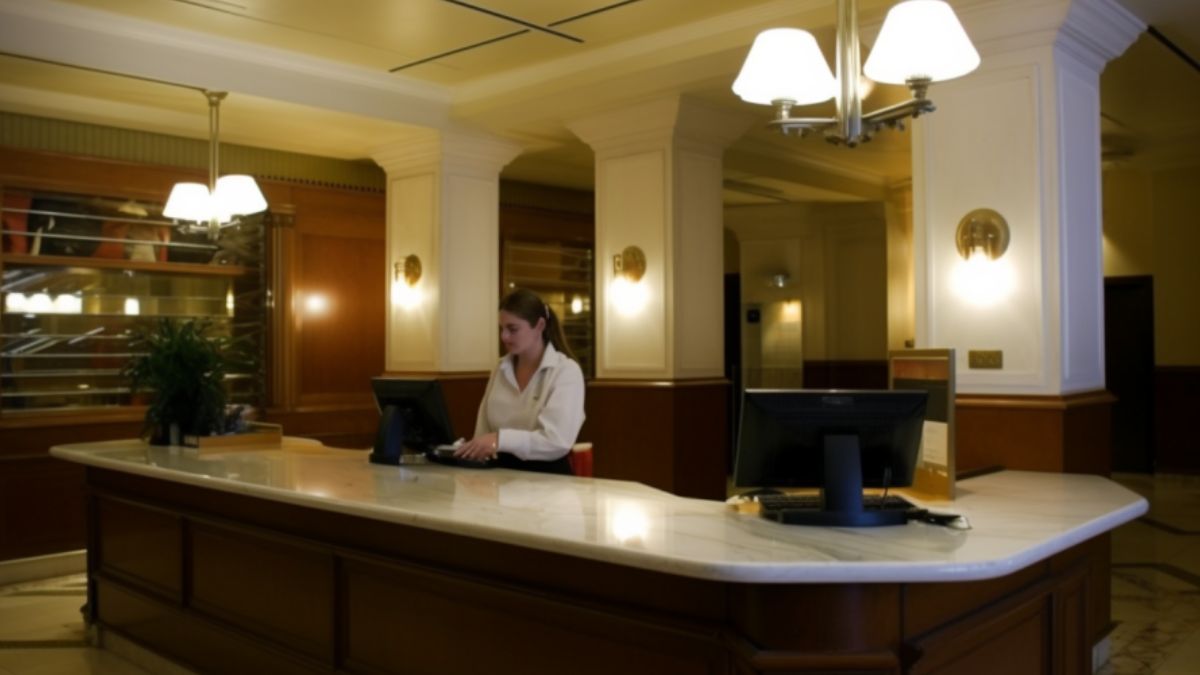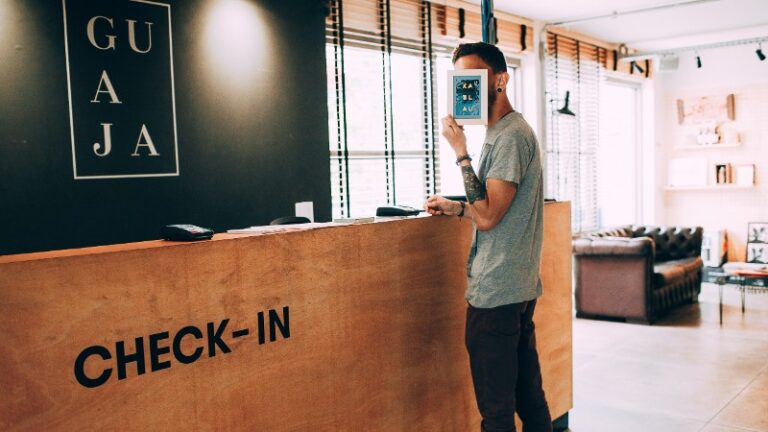Do You Have To Check Out Of A Hotel? What Happens If You Don’t?

As participants in Amazon Associates and other programs, we earn from qualifying purchases. This comes at no additional cost to you. For more details, see our Affiliate Disclosure.
In the world of hospitality, it’s common to wonder what the actual purpose and importance of formally checking out of a hotel is. Is it mandatory? Can you simply pack your bags, walk out the door, and never look back? And what are the potential repercussions if you choose to do so?
In this article, we will delve into the complexities of hotel etiquette, exploring the protocols that surround the seemingly simple act of hotel check-out. From understanding the necessity of this procedure to knowing what could possibly transpire if you don’t comply, we’ll cover it all. Prepare to be enlightened about the intriguing intricacies of hotel check-out norms that ensure a seamless, respectful and satisfactory experience for both guests and hotel staff alike.
The Importance of Checking Out: A Closer Look
The act of checking out of a hotel is more than just a formality; it plays a crucial role in hotel operations and affects a range of factors, including room cleaning, inventory management, and billing procedures.
To start with, checking out informs the hotel that you have vacated the room, thereby allowing housekeeping to clean and prepare the room for the next guest. This is vital in ensuring the room is ready in time for incoming guests, maintaining the smooth flow of occupancy, especially in high-demand periods.
Next, the check-out process gives the hotel a chance to go through the room for any left-behind items, ensuring these are safely returned to the guest, and to inspect the room for any damage or missing items. This serves as a preventative measure for potential disputes and misunderstanding between the hotel and the guest.
From the perspective of billing, checking out closes the financial transaction between you and the hotel. This is when any outstanding charges such as room service, mini-bar usage, or other services used during the stay are settled. This prevents any errors in billing, protects against fraud, and ensures a transparent and fair payment process for all parties involved.
Lastly, the act of checking out also provides a valuable opportunity for guest feedback. Hotels often use this time to learn about your stay, any issues you might have faced, or suggestions for improvement. This interaction is an essential part of maintaining and improving service quality.
In essence, checking out of a hotel is a crucial part of the hospitality cycle that helps uphold the industry’s standards of service, cleanliness, and customer satisfaction.
What Happens If You Simply Leave Without Checking Out
When you leave without checking out, the consequences aren’t typically immediate or severe, but they can cause inconvenience to both you and the hotel staff.
Firstly, your room may not get cleaned as promptly. Housekeeping staff will usually wait for a guest to check out before entering the room to clean it. If you don’t check out, the staff might assume you’re still in the room, causing unnecessary delays in preparing the room for the next guest.
Secondly, any items you may have left behind won’t be noticed as quickly. If you’ve forgotten something in the room, the hotel might not find it until much later when they eventually realize you’ve left, and by then it might be too late to return it to you promptly.
In terms of billing, if you’ve used any additional services like room service or the mini-bar, the hotel will charge these to the credit card you used at check-in. However, any discrepancies or errors in these charges might not be caught as quickly if you don’t check out. This could result in mistaken charges or disputes later on.
Moreover, some hotels might charge a late check-out fee if you haven’t officially checked out by the specified time, and they believe you are still in the room. Even if you’ve left, they might add this charge to your bill since they weren’t informed of your departure.
Finally, repeatedly failing to check out could lead to hotels viewing you as a less responsible guest. If you’re a member of the hotel’s loyalty program, it could potentially impact your standing. While this is less common, it is something to bear in mind.
So while leaving without checking out might seem like a time-saver, it can lead to inconvenience and potential extra charges. It’s generally better to take a few minutes to inform the hotel of your departure and make sure everything is in order.
Potential Consequences of Not Checking Out
While leaving a hotel without officially checking out may not seem like a serious breach of etiquette, it can actually result in a variety of unintended consequences. Let’s explore some of these potential repercussions.
- Delayed Room Cleaning: Hotel housekeeping relies on guests checking out to know when a room is vacant and ready for cleaning. If you don’t check out, it may delay the cleaning process and disrupt the hotel’s scheduling, causing inconvenience for the staff and the next guest.
- Lost Items: If you accidentally leave something behind, the hotel might not discover it until much later. This could make it more challenging to return your belongings, especially if you’ve already left the area.
- Billing Errors: When you check out, the hotel finalizes your bill, adding charges for any additional services like room service, minibar use, etc. If you don’t check out, these charges will still be billed to your credit card, but you won’t have the opportunity to review them for accuracy.
- Late Check-out Fees: Some hotels might automatically assume you’ve overstayed and charge a late check-out fee if you haven’t officially checked out by the designated time. This could be an unwelcome surprise when you see your final bill.
- Negative Impact on Guest Reputation: If you consistently fail to check out of hotels, it might affect your reputation with the hotel or within its broader network, especially if you’re a member of a loyalty program. Hotels prefer responsible guests who respect their policies, and not checking out can be seen as disregarding those policies.
While the consequences of not checking out are not often severe, they can cause unnecessary complications and charges. Taking a few extra minutes to formally check out can help avoid these potential issues, ensuring a smooth end to your hotel stay.
How Hotels Deal with Guests Who Don’t Check Out
Hotels have established procedures to handle situations where guests do not formally check out. Here’s what generally happens:
- Attempt to Contact the Guest: The hotel staff will typically first try to contact the guest. They might call the room, knock on the door, or attempt to reach you on your provided contact number to ascertain your plans.
- Check the Room: If they can’t get in touch with you, and it’s past the check-out time, the staff may enter the room (typically with a hotel security personnel or manager) to check if you have indeed left. This is usually done as a last resort, and privacy is respected as much as possible.
- Settling the Bill: If it’s confirmed that you have left, the hotel will close out your bill. Any charges you incurred during your stay, such as room service, mini-bar, or pay-per-view expenses, will be charged to the credit card you provided during check-in.
- Late Check-out Fees: If you’ve overstayed past the check-out time, even if you’ve already left the room, some hotels might charge a late check-out fee. This varies based on hotel policies.
- Handling Left-behind Items: If you’ve left any personal belongings behind, the hotel will usually place them in lost and found. They may also attempt to contact you to arrange return of your items.
- Dealing with Damage or Missing Items: If they find any damage to the room or missing items, these charges will also be added to your bill. In extreme cases, the hotel might involve law enforcement.
While hotels have these procedures in place, it’s always best to check out formally to ensure a smoother process for both you and the hotel staff. It can help avoid any misunderstandings or unnecessary charges, and it allows you to address any issues with your bill directly.
Possible Exceptions: When Is Checking Out Not Required?
While the standard practice in hotels is to expect guests to formally check out, there are circumstances where this isn’t strictly necessary. Let’s look at some exceptions to this rule.
- Express Check-Out: Many hotels, particularly those catering to business travelers or offering high-tech conveniences, provide an express check-out service. This option often involves leaving your key in the room or dropping it in a designated box, and the bill is then emailed to you. Any additional charges are automatically billed to the credit card on file.
- Mobile Check-Out: With the rise of technology in the hospitality industry, mobile check-out is becoming increasingly popular. In this scenario, guests can check out through a mobile app or the hotel’s website without needing to interact with the front desk. The bill is generally sent electronically, and any additional charges are handled in the same way as express check-out.
- Long-term Stays: In some extended stay hotels or serviced apartments, the check-out process may be less formal. You may simply be expected to leave the key in the room or drop it at the front desk, particularly if your bill has already been settled.
- Automated Hotels: Some modern, automated hotels have no check-in or check-out process. Guests handle everything via a kiosk or online, from booking to payment. The room typically unlocks with a code or electronic key sent to the guest’s phone.
Regardless of the check-out method, maintaining clear communication with the hotel is key to a seamless experience.
Modern Technologies and the Future of Hotel Check-Out
Technology is changing the face of the hospitality industry, offering innovative solutions that streamline processes and enhance guest experiences. The hotel check-out process, in particular, has seen considerable advancements. Let’s delve into some of the key developments.
- Mobile Apps: Many large hotel chains have developed their own apps, which allow guests to manage their entire stay, including check-out, from their mobile devices. Through these apps, guests can review their bills, report any discrepancies, and confirm their check-out without visiting the front desk.
- Self-Service Kiosks: Similar to self-check-in kiosks at airports, some hotels are adopting self-service kiosks where guests can check themselves out. These kiosks can print final bills, accept payments, and even issue receipts, speeding up the check-out process.
- Keyless Entry Systems: Digital keys, where guests use their smartphones to unlock their rooms, are becoming increasingly common. When integrated with mobile check-out capabilities, guests can check out directly from their phones, and their digital keys are deactivated automatically.
- AI and Chatbots: Artificial intelligence is also making its way into the hotel industry. AI-powered chatbots can handle routine tasks such as facilitating check-outs, answering common queries, and providing electronic bills, thereby reducing the load on front-desk staff.
- In-room Smart Technology: The integration of smart devices in guest rooms also aids in the check-out process. For instance, smart TVs or tablets can display checkout information, allow guests to review their bills, and confirm their departure.
The future of hotel check-out is likely to become increasingly contactless and streamlined, offering greater convenience and flexibility to guests. However, as technology continues to evolve, it’s crucial that hotels maintain their commitment to excellent customer service, ensuring that the tech-enhanced processes are user-friendly and accessible to all guests.
Checking Out Properly: A Win-Win for Guests and Hotels
Adhering to the proper check-out procedure in a hotel is beneficial for both the guests and the hotel staff. For guests, it provides an opportunity to review and settle their bill accurately, avoiding potential disputes or unexpected charges. It also gives them a chance to provide feedback on their stay and report any issues they might have encountered.
Moreover, it ensures any items inadvertently left behind in the room can be identified and returned in a timely manner. In a broader sense, respecting the check-out procedure can enhance a guest’s reputation with the hotel, which could lead to a more personalized and satisfying experience in future stays.
For the hotel staff, when guests check out properly, it allows for effective room management. This is crucial in ensuring rooms are promptly cleaned and prepared for incoming guests, enhancing the overall efficiency of hotel operations. It also provides a clear communication channel between the hotel and its guests, allowing the hotel to address any concerns and improve their service based on the feedback received.
Furthermore, a smooth check-out process reduces potential conflicts over billing or property damage. In essence, a proper check-out process forms an integral part of the hospitality service cycle, playing a key role in maintaining high standards of customer service and operational efficiency.






